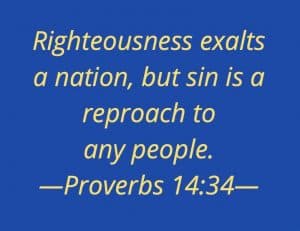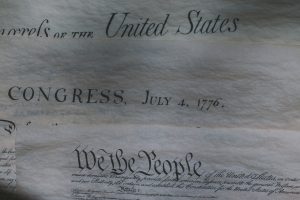What is the purpose of government? What are the duties of the Christian before government and God? When government opposes God, what should believers do? We explore these issues in a 2-part series titled “Government’s Responsibility Before God: A Brief Study of Romans 13:1-7 and 1 Peter 2:13-17.” Part 1 is available here, part 2 here, and both parts on one page here.
We summarize the series below in two lists:
-
-
- Ten Insights Gleaned from Romans 13:1-7 and 1 Peter 2:13-17, and
- A Three-Point Summary of Truths Discovered
-
Ten Insights Gleaned from Romans 13:1-7 and 1 Peter 2:13-17
- Everyone is to obey governmental authorities.
- Governments and the leaders who represent them are “appointed by God”; therefore resisting them is resisting “the ordinance of God.”
- God will judge those who disobey civil authorities.
- Government’s power is not absolute, however. Governments and their leaders have the authority they have because God has delegated it to them.
 God has delegated authority to government and its human representatives so they can and will commend those who do good and punish those who do evil. Good and evil here mean good and evil according to God’s standard, not man’s.
God has delegated authority to government and its human representatives so they can and will commend those who do good and punish those who do evil. Good and evil here mean good and evil according to God’s standard, not man’s.- God wants nations to maintain societal order. One of the reasons for this, according to 1 Timothy 2:1-4, is so people will live in social environments that don’t distract them from hearing the gospel and responding positively to it.
- God wants the people of a country to be free, to enjoy authentic liberty. Such liberty is tied to obedience to His laws.
- God does not give civil leaders authority to rule arbitrarily. They are accountable to Him and His laws. Moreover, Christians have a primary duty to obey God. If commands from government and God directly conflict, Christians must obey God. This means that in certain situations, believers are right to engage in civil disobedience.
- As Christians who live in the United States of America, we must interpret Romans 13:1-7 and 1 Peter 2:13-17 in light of our form of government. The United States is a republic, a nation ruled by law. Both leaders and citizens are under the law of the land. Furthermore, leaders are accountable to the people, for government and its representatives derive “their just powers from the consent of the governed.”
- In a free society such as ours, we as Christians can and must hold our leaders accountable. This means participating in the political process, seeking to influence leaders to lead wisely and well, and pushing back, forcefully if necessary, when they misuse or abuse their authority.
To this list we need to add one more item—a negative one (negative in the sense it describes what government is not to do).
- Government has other legitimate tasks, such as maintaining a military force to defend the country and maintaining monetary and economic systems. These are implicitly affirmed in the Bible (for examples, see Deut. 20:1; Matt. 22:15-22). What government is not authorized to do in Scripture is provide for its people. That is a job God gives to the people themselves (see Gen. 2:15; Ex. 20:8-9; Prov. 6:6-11; 12:14; 14:23; Eccl. 3:13; 5:12; Rom. 12:11; Eph. 4:28; 2 Thess. 3:6-12; 1 Tim. 5:3-8).

A Three-Point Summary of Truths Discovered
According to Scripture, citizens are to obey the government, which exists primarily to punish those who do evil and to commend or reward those who do good. As government and its representatives do these things, they also maintain order in society. Further, they uphold and protect the unalienable, God-given rights of the people, whom the Creator fashioned in His image.
When government fails to do its divinely assigned task of keeping order by commending those who do good and punishing those who do evil, and especially when it ignores or rewards evildoers and punishes those who do good, it is misusing its delegated authority, and its actions are illegitimate.
Especially in a free society such as ours, when government leaders abuse their God-given authority, Christians are obligated to call them out.
Copyright © 2020 by B. Nathaniel Sullivan. All rights reserved.
